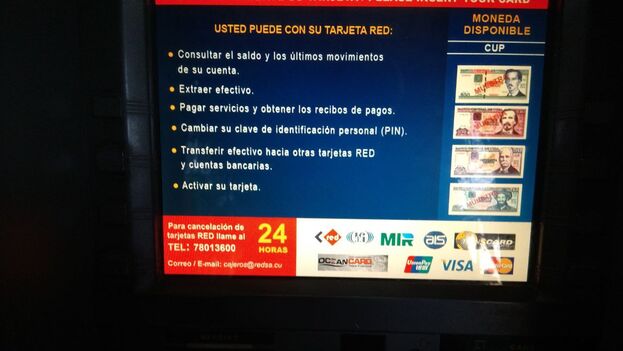
![]() 14ymedio, Juan Diego Rodriguez, Havana, 14 March 2023 — Cuban ATMs have started accepting the Mir card, part of a Russian payment system akin to Visa or Mastercard, that was launched by the Kremlin in 2016 to get around looming economic sanctions. Mir’s press office told the Russian news agency Sputnik that it is working on getting the cards accepted in “friendly countries, including Cuba, which is very popular with Russian tourists.”
14ymedio, Juan Diego Rodriguez, Havana, 14 March 2023 — Cuban ATMs have started accepting the Mir card, part of a Russian payment system akin to Visa or Mastercard, that was launched by the Kremlin in 2016 to get around looming economic sanctions. Mir’s press office told the Russian news agency Sputnik that it is working on getting the cards accepted in “friendly countries, including Cuba, which is very popular with Russian tourists.”
When asked about this by 14ymedio, an employee at a branch of Banco Metropolitano in Havana said she believed this was the case but was not sure.
What is certain is that the Mir logo can now be seen on Cuban ATMs. The payment system will allow Russians to withdraw cash, converting their rubles into pesos.
Cuba’s ambassador to Moscow, Julio Garmendía, said on Tuesday that he hoped Russian tourists would be able to use this type of card to make purchases on the island by this summer. According to an article by the state-run Prensa Latina news agency, the ambassador hopes that “all the difficulties with the introduction of the Russian payment system will be resolved soon.”
In any case, users will still face the same problem that Visa and Mastercard holders have had in many small private businesses in Cuba: these establishments do not have the POS terminals needed to read the cards, forcing their customers to pay for their purchases in cash.
For now, at least, most high-end establishments do not seem to be aware of this new system. At the Grand Aston, for example, 14ymedio was told that the hotel does not accept Mir cards. The problem, they say, is not on their end. It is because “Russian banks are blocked worldwide.”
Russia created the Mir system after the annexation of Crimea in 2014 and two years later began issuing cards for use within the country. In 2022 it tried to expand Mir’s reach beyond the country’s borders after Russia was locked out of the international banking system following Vladimir Putin’s invasion of Ukraine.
Among the countries that accept the cards are South Korea, Uzbekistan, Vietnam, Armenia, Belarus, Turkey and Tajikistan. However, the service was suspended in the latter two countries last September because ATMs and card readers were not working.
Cuba has advocated for the use of Mir cards since sanctions on Russia were tightened last year and has promised to accelerate implementation of the system. In early March, Russia’s ambassador to Havana, Andrei Guskov, said that the adoption of Mir is part of a significant number of financial and energy projects the two countries agreed upon during Miguel Díaz-Canel’s visit in November 2022.
In an interview with Sputnik, Guskov stated that plans are being discussed for the construction of new operating units at the Maximo Gomez and Habana del Este electric power plants. Cuba has been in the midst of a severe energy crisis, experiencing ongoing blackouts of up to twelve hours in 2022, with more expected this year.
Russia also has a presence in the automotive sector, with the GAZ automotive company assembling its GAZelle, Ural and PAZ vehicles in Cuba. Among the new projects, Guskov added, are plans to set up an import/export company to promote Russian products in the Cuban market.
Guskov also indicated that a project to modernize the Antillana de Acero metallurgical plant, made possible by a 111-million-dollar loan from Russia in 2017, is in its final stage .
During the pandemic, when many countries’ borders were closed, Russia supplied the bulk of the island’s foreign tourists. The numbers plunged, however, after the invasion of Ukraine due to sanctions, which closed European air space to Russian carriers. Figures from Cuba’s National Statistics and Information Office [ONEI] indicate that, by the end of 2022, only 6,623 Russian travellers had visited Cuba, a drop of 54.7% from 2021.
An article by the organization Cuba Siglo 21 [Cuba 21st Century] suggests that a visit to Cuba and Venezuela in early March by Nikolai Patrushev, secretary of the Russian Security Council, was essentially military in nature and not related to economic and scientific development projects, as reported by state media.
The article, authored by former Cuban general Rafael del Pino, speculates that Russia is edging ever closer to a humiliating defeat in Ukraine and is, therefore, trying to burnish its image in the region by establishing a naval military presence in the Caribbean, as happened during the 1962 Missile Crisis.
____________
COLLABORATE WITH OUR WORK: The 14ymedio team is committed to practicing serious journalism that reflects Cuba’s reality in all its depth. Thank you for joining us on this long journey. We invite you to continue supporting us by becoming a member of 14ymedio now. Together we can continue transforming journalism in Cuba.
